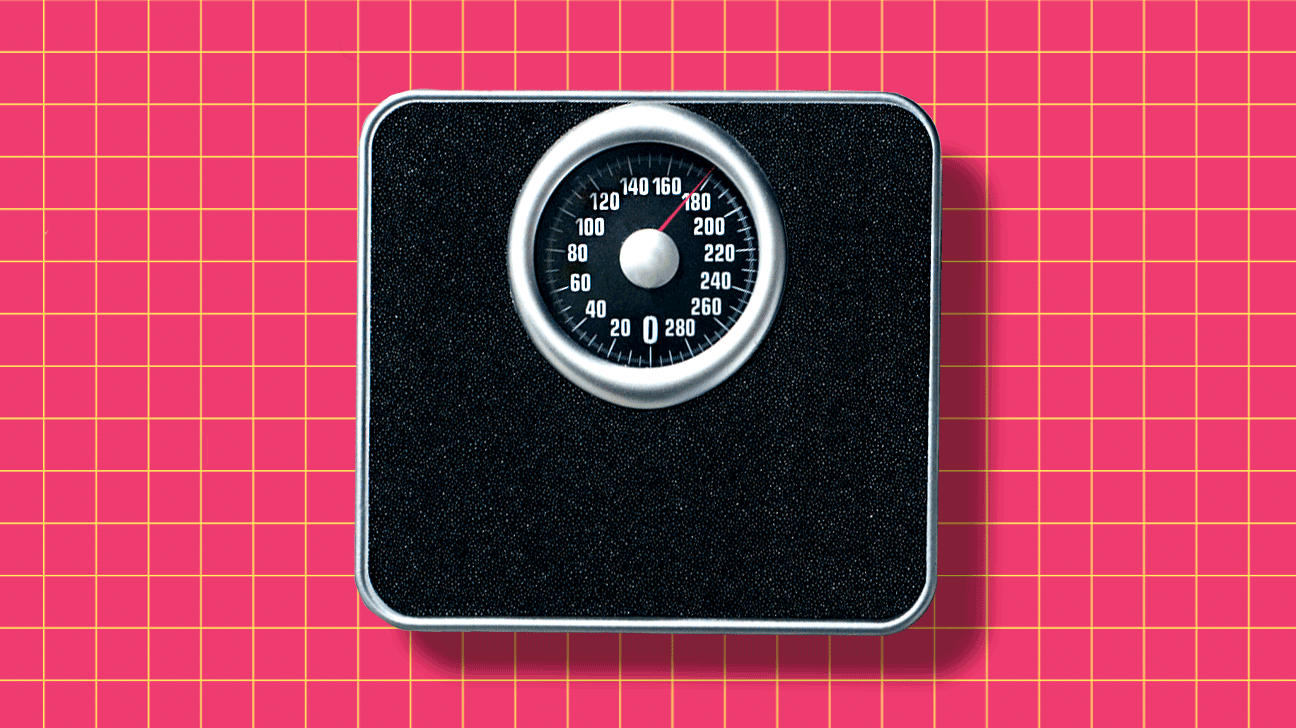Maybe you want to get healthier or you’re hoping to fit into your favorite pair of jeans. Whatever the reason, it’s totally legit to love your bod and want to lose weight.
TBH, your weight isn’t a very accurate measure of health, but stepping on the scale is a fast, cheap way to track general slim-down progress.
Still, weighing yourself can get tricky. Like, when’s the best time to step on the scale? And, does it matter if you use the scale at home or at the gym?
Basically, what’s the correct way to weigh yourself?
👍 Here’s the best way to weigh yourself…
- Grab your scale first thing in the morning — after you’ve peed, but before you’ve had a bite to eat.
- Put the scale on a hard, flat surface. Bathroom floors work best.
- Step onto the scale barefoot (in your birthday suit is best, TBH). Both feet. Weight evenly distributed.
- Stand still!
- Tracking weight loss or gain over time? Write down the number and date.
The scale isn’t the whole picture. Here’s how to weigh yourself while keepin’ it #BodyPositive:
1. Stick to weekly weigh-ins
It’s tempting to slide up to the scale all day, every day when you’re pumped about slimming down or bulking up. Our advice? Don’t.
From period puffiness to salt bloat, there are tons of reasons why your weight changes from day to day. In fact, one study found that folks tend to weigh more on the weekends because of different eating, sleeping, and exercise habits!
So, choose a day of the week and stick to it. Weekly weigh-ins will give you a waaaay more accurate snapshot of how your weight is truly changing.
2. Weigh yourself first thing in the morning
On “weigh-in Wednesday,” or whatever day you choose, hop on the scale first thing in the morning. That means after you pee, but before your morning cup of joe.
Why morning? Because it’s consistent. It’s also the time your weight is least likely to be affected by food (making you weigh more) or exercise (making you weigh less).
Pro tip: If possible, weigh yourself naked to keep your cozy flannels from messing with the numbers. We’re talking peak #IWokeUpLikeThis.
3. Use the same scale
Consistency is key here, and that includes your equipment! Your weigh-ins should be on the same weekday, at roughly the same time, and using the same scale.
It’s just not true that all scales are created equal. Even the scale at your doctor’s office could be off. In one study of 27 childcare clinics, less than 11 percent of the scales were truly accurate! 🤯
So, how do I know if my scale is calibrated correctly?
Your best bet is to test it on a hard, flat surface. Check to make sure the scale says 0.0 pounds with nothing on it. If the scale is off, check your user manual for instructions on how to adjust it.
Your consistency is more important than your scale’s accuracy.
Think about it: If your scale is 0.25 pounds off the mark one week, it’s likely to be off by the same number next week. So, if it says you lost 1.5 pounds, congrats — you did! But your numbers won’t align if you switch scales all the time.
Moral of the story: Get yourself a scale, ask for a recommendation from your doc or trainer if needed, and stick to it. #Consistency
4. Have a goal in mind — and track it!
If you’re stuck in a routine of weighing yourself daily, pause for a hot sec: What’s your gameplan? Why are you weighing yourself?
Sometimes it helps to evaluate your relationship with the scale. One research review suggested that weighing yourself every day can be helpful when you have specific weight goals, but it can trigger anxiety if you’re not careful.
Get the perks of weekly weigh-ins by having a clear goal in mind. Then make sure you track your progress!
Weight loss apps can be fun, but there’s no need to get fancy. There are so many ways to track your weight using a:
- notebook
- spreadsheet
- weight loss app
- smart scale
Weight tracking can also help you see patterns in your health. Maybe you gain 1 or 2 pounds when you’re on your period. Or maybe you do well at the beginning of the month, then plateau. Patterns give you a better grasp of your overall health and habits.
5. Decide when it’s time to ditch the scale
Know thyself. It is 100 percent OK to drop your scale at the nearest Goodwill if it isn’t adding to your life.
Weekly weigh-ins make you feel like sh*t? Then stop!
Getting a little obsessed over the numbers? Take a break for a few weeks.
Are you skipping meals or using diet pills before stepping on the scale? That’s a form of disordered eating, which means it’s a good time to stop weighing yourself.
Using a scale isn’t for everyone. It’s also not the single or best way to track your health. Try measuring your body fat percentage or counting macros instead. Maybe even disconnect your FitBit and reconnect with how your body feels for a while.
Bottom line: If you’ve ever had an anxiety disorder or eating disorder, weighing yourself on the reg can be triggering. Leave the weigh-ins to your doctor and focus on what matters: Your health and happiness.
Weigh yourself…
- weekly
- in the morning
- the same way every time
- with a purpose and a tracker
- only if it doesn’t trigger anxiety or disordered eating


